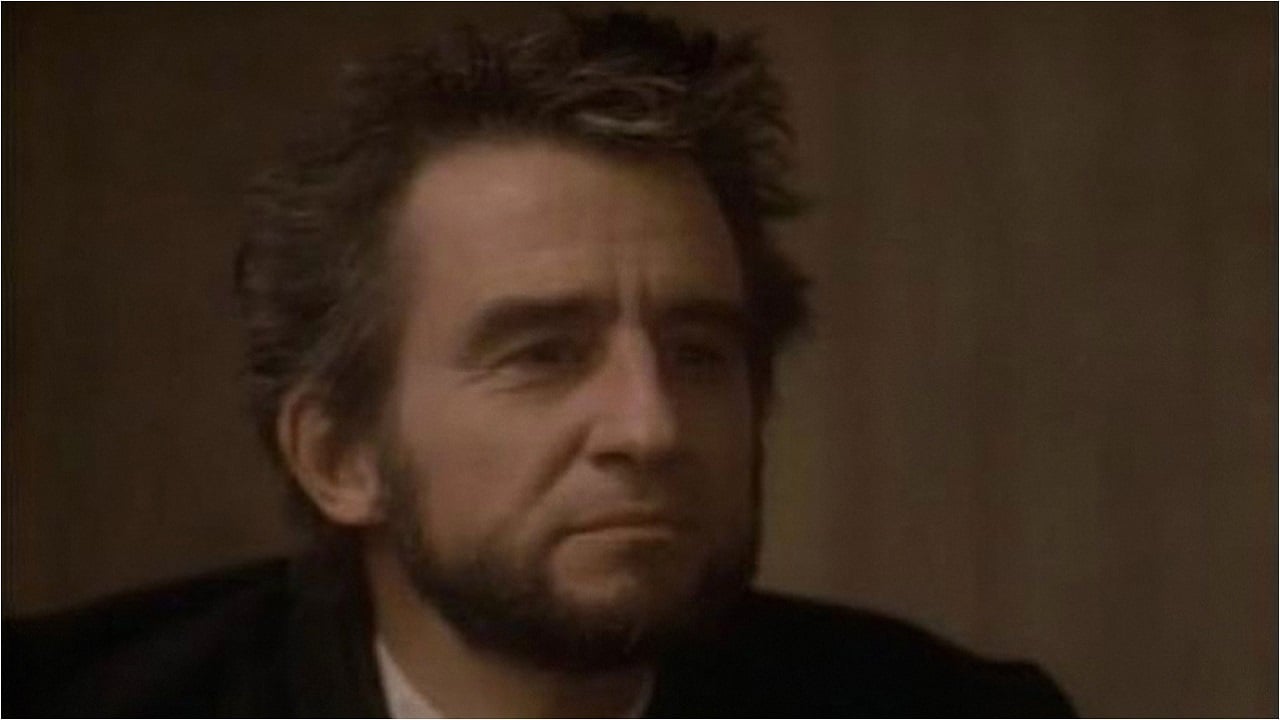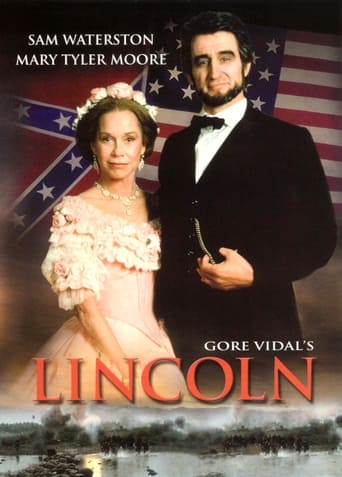Interesteg
What makes it different from others?
Titreenp
SERIOUSLY. This is what the crap Hollywood still puts out?
FrogGlace
In other words,this film is a surreal ride.
Bob
This is one of the best movies I’ve seen in a very long time. You have to go and see this on the big screen.
HotToastyRag
I remember the massive hype for 2012's Lincoln, priming audiences and voters to give Daniel Day-Lewis another Oscar. The powers that be touted his performance, claiming no one had ever played Abraham Lincoln the way he had, and he was being realistic in his performance, speaking in a thin, rather high-pitched voice as Lincoln really did. They said watching the film was like seeing Lincoln peeled from a painting and come to life. Well, "they" clearly missed the television adaptation of Gore Vidal's bestselling Lincoln, starring Sam Waterston as the nation's most beloved president. In 2012, Daniel Day-Lewis just put on a beard. In 1988, Abraham Lincoln truly came to life.I already love Sam Waterston and find him an incredibly talented actor, but if there's anyone out there who hasn't seen his movies, watching Lincoln will make you a life-long fan. His posture, mannerisms, walk, accent, and facial expressions are not his usual; it's clear from the first scene Sam studied everything about the president to make his performance as authentic as possible. While Hal Holbrook wins the look-a-like contest in his beloved Lincoln portrayals in North and South and the 1970s miniseries Lincoln, Sam emits an aura that makes you forget about Hal for a while. When you're watching Sam, you believe he was raised in a log cabin. You believe he's Honest Abe.In addition to the historically accurate tidbits included in Ernest Kinoy's script, the production values of the film are wonderful. It doesn't feel at all like a 1980s TV movie. The costumes are beautiful, the production and art directions are extremely realistic, and the choice of using muted and dusty colors makes all the difference in the world. Usually, British movies have the market cornered on authentic lighting, but Joe Clayton, chief lighting technician for the film, did a fantastic job giving audiences a view of how things really looked during the Civil War.Co-starring Mary Tyler Moore as the tragic figure Mary Todd Lincoln, Richard Mulligan as Secretary Seward, Steven Culp as Lincoln's secretary, Ruby Dee as Mary's dressmaker, David Leary as General McClellan, and John McMartin as Senator Chase, this three-hour tribute to Lincoln's presidency is extremely entertaining. Lamont Johnson won an Emmy for his direction, and Mary and Ruby were nominated for their performances, as were the hairstylist, art directors, costume designers, and film as a whole. Sam's performance was ignored, and when you watch the movie, you'll be as stumped as I am. Pair it with Ken Burns's The Civil War for a reprise of Sam Waterston's role, or with A House Divided to see Sam in another Civil War drama, but playing a villain!
Robert J. Maxwell
The natural tendency of a TV movie made about a turbulent time in history is to turn the story into a soap opera. That way, the producers can avoid expensive and expansive battle scenes with millions of extras, impeccable props and sets, monumental stars, and dialog that, having been rewritten and polished to a sheen, sings with poetry. Instead we can get a love triangle with two people in each scene, arguing and insinuating away to beat the band.This isn't that kind of TV movie. In the first place, it's adapted with some felicity by Ernest Kinoy from Gore Vidal's novel. The novel itself, while no masterpiece, wasn't bad and it stuck pretty close to historical facts. Vidal's characters, as he himself put it, went where they did and did what they did much as they did in real life. The novel had its amusing moments too, some inadvertent. Aboard a boat in Chesapeake Bay, Vidal has the weather worsening because "the wind was now coming from leeward." But at least he didn't turn Lincoln into a closet homosexual.The battle scenes are a little perfunctory, probably because there wasn't as much money sunk into this production as Turner had available for the elephantine "Gettysburg." But the battle scenes aren't too important anyway. It's the outcome of the battles that count, and these are written into the dialog. It's enough to know that on the peninsula, General George McLellan was outmaneuvered by a Confederate force that he outnumbered ten to one. (The film doesn't mention it but the Rebs were led by a general who in civilian life had been a theatrical actor.) The film divides itself about equally between three narrative threads. (1) Lincoln's conduct of the Civil War. (2) Lincoln's political battles with his adversaries. And (3) Lincoln's life at home with his dysfunctional family.And, boy, what a dysfunctional family it was. Abe and Mary Todd Lincoln were equally matched. She was manic and he was depressive. (I eschew the unnecessarily lengthy definitions.) Mary's impulsive and ill-judged buying sprees were symptomatic, as was Abe's severe depression as a young man. One of their three children suffered from Attention Deficit Disorder with Hyperactivity, which is made clear in the novel but not in the film. Furthermore, Mary, a firm abolitionist but not a radical one, came from a slave-owning family in a border state. Some of her relatives fought on the other side. Lincoln himself, a pragmatist, only freed some of the slaves with his Emancipation Proclamation, and he had to wait for a Union victory to announce it in order to keep the Republican congress in power. (Antietam -- some "victory".) Anyway, that's a lot of potential domestic conflict to explore.Sam Waterston as Lincoln, Mary Tyler Moore as Mary Todd Lincoln, Richard Mulligan and Tom Brennan as cabinet members, Steven Culp as Lincoln's secretary, and Ruby Dee as Mary Lincoln's handmaiden pull it all together in a surprisingly effective way. There isn't a sour note in the bunch. Even the smaller roles, like Jeffrey DeMunn as Lincoln's former law partner, William Herndon, are well played.The script is sprinkled with Lincoln's down-home expressions and his colorful analogies. McClellan has "a case of the slows." And if Little Mac isn't going to use his Army, Lincoln proposes to borrow it for a while and put it to work. When Lincoln suspects that the City Council in Baltimore is about to meet and may secede from the union, he throws the lot of them in jail and dispenses with habeus corpus. Can you imagine such a thing happening today? The movie leaves out a lot of Abe's bon mots but it's just as well because in the end, this is a tragic story, in more ways than one. Not only does the war kill more Americans than all our other wars combined, but of course Lincoln, perhaps our greatest president, is assassinated by a zealot. And Mary goes mad and is placed in a sanitarium for safe keeping by her own children. And there followed the destruction and humiliation of the South during Reconstruction, ensuring a lasting bitterness between two cultural regions that remained almost separate nations for the next hundred years.I'm glad this movie was made -- and made as well as it was. Lincoln held the country together during its most perilous years. Some may claim his reputation has been inflated but it's hard to see how it could have been. The movie should be shown in high school history classes -- maybe college history classes too. In a poll about ten years ago, a substantial number of college freshman couldn't place the American Civil War in its proper half-century. What's worse, the percentage didn't improve among seniors.
Swampthing316
Mary Tyler Moore gives the best portrayal of Mary Todd Lincoln I have ever seen on screen.Sam Waterson gives a very different portrayal of President Lincoln than we are used to. Generally, when we think of Lincoln we think of a man with a deep voice due to the fact that he was a very tall man and was well built. However Lincoln in fact did not have a deep voice according to some reports that I have read, in fact he had a high pitched voice and he had that Kentucky accent. (Kentucky? The Hell you say, Lincoln was from Illinois, yes this is true, however Lincoln was born in Kentucky, he was raised mostly in Illinois though)This film gives us a good look at Lincoln the man, at the True Abraham Lincoln. Yes this film only spends a small amount of time on the assassination and spends none on the conspirators at all.If you want to see a very good portrayal of the Lincoln assassination that is very in depth, try watching "The Day Lincoln was Shot" which was a television movie made for TNT. In fact the "Day Lincoln was shot" is a nice accompanying piece to this movie. If you ever get the opportunity to watch either one of these films take it you won't regret it.
studiojudio
This is NOT "unbelievable garbage", as some other critics, here, would say.
I am tired of those who would compare books to the movies made from them. For God's sake, a movie is INTERPRATIVE!!! When you read "The Nutcracker Suite", do you criticize the very beautiful ballet because EVERY WORD of the original book is not adhered to?The PERFORMANCE given by Mr. Waterston is enough to launch this vehicle into greatness. He is simply wonderful.You can HAVE Mary Tyler Moore. But Waterston is astonishing. And he always IS. If people insist on criticizing films because they don't "match" the book from which they are taken, I suggest that they do NOT call themselves "film lovers".This theory has been argued for decades, but still, people do not understand.It is IMPOSSIBLE to put every thought, every line from a book, into a film. Please get used to this.Thanks so much. -Studiojudio

